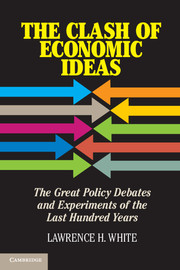Book contents
- Frontmatter
- Contents
- Figures
- Acknowledgments
- Introduction
- 1 The Turn Away from Laissez-Faire
- 2 The Bolshevik Revolution and the Socialist Calculation Debate
- 3 The Roaring Twenties and Austrian Business Cycle Theory
- 4 The New Deal and Institutionalist Economics
- 5 The Great Depression and Keynes’s General Theory
- 6 The Second World War and Hayek’s Road to Serfdom
- 7 Postwar British Socialism and the Fabian Society
- 8 The Mont Pelerin Society and the Rebirth of Smithian Economics
- 9 The Postwar German “Wonder Economy” and Ordoliberalism
- 10 Indian Planning and Development Economics
- 11 Bretton Woods and International Monetary Thought
- 12 The Great Inflation and Monetarism
- 13 The Growth of Government
- 14 Free Trade, Protectionism, and Trade Deficits
- 15 From Pleasant Deficit Spending to Unpleasant Sovereign Debt Crisis
- Index
- References
4 - The New Deal and Institutionalist Economics
Published online by Cambridge University Press: 05 June 2012
- Frontmatter
- Contents
- Figures
- Acknowledgments
- Introduction
- 1 The Turn Away from Laissez-Faire
- 2 The Bolshevik Revolution and the Socialist Calculation Debate
- 3 The Roaring Twenties and Austrian Business Cycle Theory
- 4 The New Deal and Institutionalist Economics
- 5 The Great Depression and Keynes’s General Theory
- 6 The Second World War and Hayek’s Road to Serfdom
- 7 Postwar British Socialism and the Fabian Society
- 8 The Mont Pelerin Society and the Rebirth of Smithian Economics
- 9 The Postwar German “Wonder Economy” and Ordoliberalism
- 10 Indian Planning and Development Economics
- 11 Bretton Woods and International Monetary Thought
- 12 The Great Inflation and Monetarism
- 13 The Growth of Government
- 14 Free Trade, Protectionism, and Trade Deficits
- 15 From Pleasant Deficit Spending to Unpleasant Sovereign Debt Crisis
- Index
- References
Summary
Rexford G. Tugwell sat in a marble-clad lobby in Rome, Italy. It was October 1934. A Columbia University economist who had become a key policy adviser to President Franklin Roosevelt and an architect of New Deal programs, he was waiting to meet with Benito Mussolini, the Italian Prime Minister and Fascist Party leader. Tugwell had been following Italy’s economic policy experiments with keen interest. He saw in Italian fascism an economic policy model with some attractive features. In his diary two nights earlier, Tugwell had written that Mussolini’s regime was “doing many of the things which seem to me necessary” and was “the cleanest, neatnest [sic], most efficiently operating piece of social machinery I’ve ever seen. It makes me envious.” Tugwell was not alone in wanting to rationalize the social and economic systems of the United States. Before 1935 many Progressives could and did admire aspects of fascism’s economic system, despite their distaste for its repression of civil liberties. American expressions of admiration for Mussolini’s economic policies declined after his invasion of Abyssinia in 1935 and finally stopped when he allied with Hitler the following year.
FRANKLIN ROOSEVELT AND THE COMMAND-ECONOMY MODEL
Franklin Delano Roosevelt assumed the American presidency on a rainy afternoon in March 1933, during the depths of the Great Depression. In his first inaugural address he declared that the federal government must treat the depression “as we would treat the emergency of war.” He was not speaking abstractly. Roosevelt was proposing to revive the Wilson administration’s command-economy measures from the First World War. Under Wilson’s measures of 1917–18 the federal government had imposed nonmarket command and control measures on industry. A cluster of new federal bureaus (the War Industries Board, the U.S. Food Administration, the U.S. Fuel Administration, and their many subsidiaries) enlisted business firms and labor unions into an effort to restrict competition and plan output through industrial cartels. Tugwell advised Roosevelt to revive such efforts in new forms.
- Type
- Chapter
- Information
- The Clash of Economic IdeasThe Great Policy Debates and Experiments of the Last Hundred Years, pp. 99 - 125Publisher: Cambridge University PressPrint publication year: 2012



